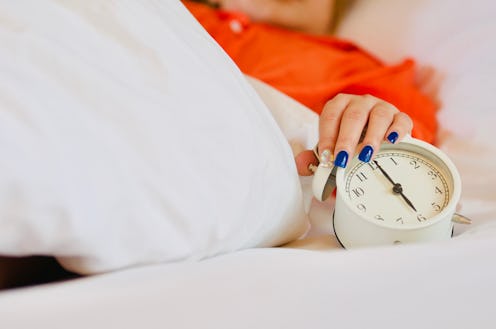Life
What Happens To Your Brain When You Wake Up To An Alarm

No matter how peaceful your alarm tone is, jolting awake to it is likely not a peaceful experience. And if you wake up to an alarm regularly, the recurring sound of your chosen alarm tone, morning after morning, immediately triggers feelings of dread. We wanted to know what actually happens to your brain when you wake up to an alarm vs. naturally, because we had a hunch that crashing into the day to the tune of a midi keyboard tone was not the best way to start it.
While it would be great if we could all naturally wake up at the exact moment we need to be awake in order to make it to work or school on time, that's not a reliable concept. The reality is that we have fluctuating schedules and sleep hygiene practices, and more often than not, many of us need to wake up far earlier than we would naturally wake up. Bustle talked to sleep expert and specialist Whitney Roban about what's actually happening internally when that alarm bell rings and we're still in a deep sleep.
According to Roban, if "shock" is the first thing you sense when you wake up, you're right on. "Sound alarm clocks shock our brain and bodies into waking. If you are still in a deep stage of sleep, this will feel even more shocking to your system, to the point that it can increase heart rate and blood pressure, as well as cause your body to secrete adrenaline."
It's no wonder our mornings begin with a layer of chaotic fog over them. We are quite literally having a full body alarm response, meaning it's not just our dreams that are being shaken off, it's also our state of mind that's being intensely affected. "This is a very stressful, and not a healthy or good way to start the day," Roban tells Bustle, going on to say that she actually doesn't recommend sound alarm clocks at all.
If you're wondering how, as modern people with places to be in the morning, we can possibly function reliably without an alarm clock, Roban believes that with the right sleep hygiene, we can actually rely on our internal clocks to wake up. "People who are well-rested and getting their bodies’ required amount of sleep per day, will not need an alarm clock to wake up," Roban tells Bustle. When you wake up naturally, you're not entering the day with adrenaline coursing through your body. Instead, you're able to slowly come into your consciousness, keeping your relaxed state near.
To achieve this, when you have the time, get to know your natural sleep schedule. Experiment with going to bed early and see what time you naturally wake up. Once you get to know your natural rhythm, you'll be able to anticipate how many hours you need, and plan for the proper time to go to bed in order to wake up at the desirable time. If you have to wake up before it's light out and can't rely on circadian rhythm response to daylight, Roban suggests investing in a sunrise alarm clock. This device uses light to stimulate the rising of the sun, allowing us to wake up gradually, which, according to Roban is a far more "natural way to wake up than blaring sound." It is also beneficial in that "the increased light helps set our circadian rhythm for the day, which controls our sleep/wake cycles" — not to mention, it's a cool looking clock. "You will sleep better when your circadian rhythm is appropriate and consistent," Roban adds. While noise-making alarm clocks are sure to wake you up at the exact moment you need to be up, sunrise alarm clocks will wake you up at a slower pace, but also work as a supplement for your health and be far more effective in starting you off on the right foot.
If you absolutely must rely on a noise-making alarm to get up, Roban insists that at the very least, that you do not use your phone's alarm. The best sleep hygiene practices call for some distance between you and your phone at night, meaning you should keep it out of reach. When your alarm goes off in the morning, don't press snooze. You might think getting a few extra minutes in is helpful, but it's actually more detrimental to fall back into a deep sleep in between alarm bells than it is to just wake up before you feel ready. "If you hit snooze, you will feel worse, as it will confuse your bodies’ circadian rhythm," Roban adds.
The best way to eliminate alarm clocks from your life and transition into a less stressful natural sleep cycle is to go to bed earlier. If you can wake up before an alarm clock would ring and rally to drag yourself out of bed without sneaking in an extra snooze, you'll be more awake and more energized, faster.
Expert
Whitney Roban, Sleep Specialist, and Author.
This article was originally published on